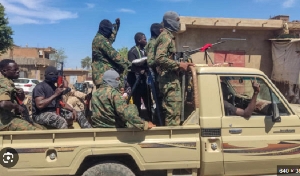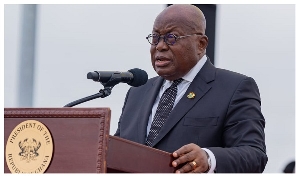- Home - News
- TWI News | TV
- Polls
- Year In Review
- News Archive
- Crime & Punishment
- Politics
- Regional
- Editorial
- Health
- Ghanaians Abroad
- Tabloid
- Africa
- Religion
- Election 2020
- Coronavirus
- News Videos | TV
- Photo Archives
- News Headlines
- Press Release
General News of Thursday, 9 November 2006
Source: Agence France/GHP
Executed Ghanaian Soldiers Pardoned
London, UK (GHP) -- Two Ghanaian (Gold Coast) soldiers executed for cowardice and desertion during World War I were pardoned today.
In all, more than 300 British and Commonwealth executed soilders were pardonend by the British government, in a move hailed by some families as proving they were "victims of war".
As well as Ghanaian and British troops, the pardon would also apply to 23 personnel from Canada, three from New Zealand, two from the West Indies and one each from Sierra Leone, Egypt and Nigeria.
In making its decision, the British Ministry of Defence (MoD) consulted Ghana and several countries that were all part of the British Empire at the time.
The names of the Ghanaians soldiers have yet to be released by the MoD and no official statement has yet been issued by the givernment.
The pardon, which covers 306 men shot at dawn during the 1914-1918 conflict, was announced by the British Government in August, but was enshrined in law with the passage of the Armed Forces Act by their Parliament. The Act gained formal approval by Queen Elizabeth, today.
Families of the men in UK immediately hailed the pardon, saying it finally acknowledges that they were victims of war. They have long contended the men were suffering from undiagnosed shell shock or faced unjust trials.
In a statement, UK Defence Secretary Des Browne insisted that the move was not about "rewriting history''.
But he said: "I believe it is better to acknowledge that injustices were clearly done in some cases -- even if we cannot say which - and acknowledge that all these men were victims of war. "I hope that pardoning these men will finally remove the stigma which their families have lived with for years.'' The statutory pardon - as opposed to a conditional or absolute pardon, which need to be granted in courts based on fresh evidence - applies to those shot in WWI under the Army Act 1881 and the Indian Army Act 1911. It covers so-called "battlefield'' offences, including cowardice and desertion, where soldiers' actions may have been influenced by the stress of battle during the bloody 1914-1918 conflict. Britain's move follows a New Zealand government decision in 2000 to pardon five of its soldiers and fresh calls in March to do the same for 26 Irish-born soldiers who were shot.
The Ghana government is yet to comment on the pardons, but the Irish Foreign Minister Dermot Ahern, who had campaigned on behalf of 26 Irish-born soldiers, today welcomed the pardons which he said recognised "that execution was not a fate these young men deserved".
The pardons end a 16-year-long drive led by John Hipkin, who founded the Shot At Dawn campaign in 1990 after he learned that four 17-year-old boys had been among those executed. "It's about time there was a blanket pardon given to all the British (and Commonwealth) soldiers who were shot... That's what we got,'' Mr Hipkin said. Mr Hipkin said Britain was "among the most ruthless'' of the nations fighting WWI in how it dealt with cases of desertion and cowardice, executing far more than other nations such as Germany and New Zealand. In singling out what he termed a major injustice, he said only two British officers were executed during WWI.











